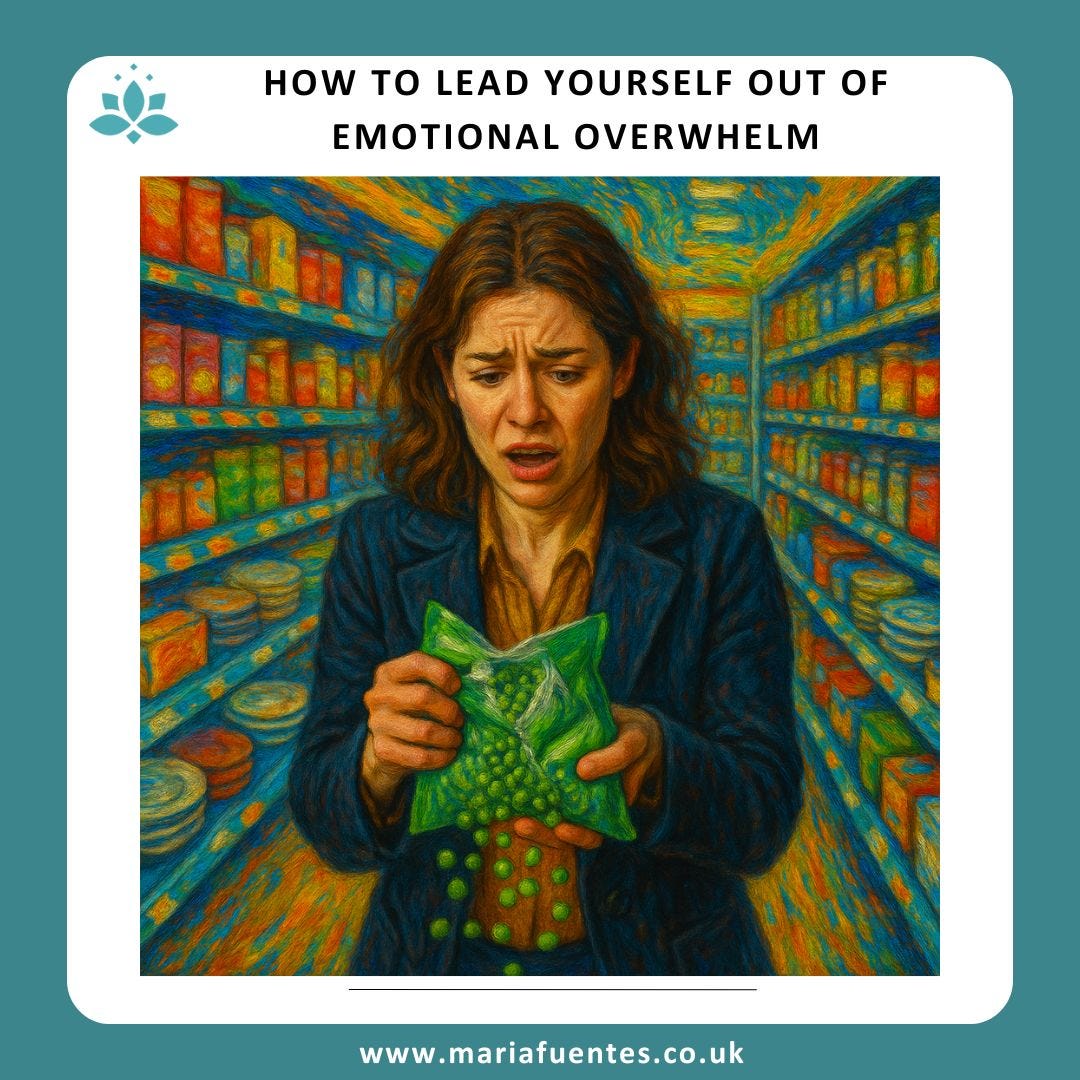How to Lead Yourself Out of Emotional Overwhelm
There are days when it all feels like too much. Not just the tasks but the tension beneath them. You are answering emails while mentally planning dinner, trying to focus while your chest tightens under the weight of things unsaid. You tell yourself to push through, but every step feels heavier than the last.
Emotional overwhelm is not a weakness. It is a signal. And like all signals, it is not there to shame you. It is there to guide you.
The Funny (and Too Real) Story We Can All Relate To
A client once told me she knew she was overwhelmed when she found herself crying in the frozen food aisle. Why? Because she dropped a bag of peas. That was it. One minor moment after a day of keeping it all together. She stood there, blinking back tears, next to the oven chips, thinking, “I am not crying about peas. I am crying because I have no room left.” She laughed as she told me; however, it was not funny at the time.
It was not the peas. It was everything the peas touched: her workload, the constant mental strain, the unread messages, the tight chest. Overwhelm is not caused by big things. It is when your system is so flooded that even small things tip the bucket.
What Overwhelm Really Means
Emotional overwhelm is not just stress. It is a state of disorganisation in your nervous system. Your brain struggles to prioritise. Your body lives in tension. Your emotions feel louder and less manageable.
According to the University of California, Berkeley, chronic stress impacts the prefrontal cortex—the part of the brain responsible for decision-making and emotional regulation. (UC Berkeley)
Which means the more overwhelmed you are, the harder it becomes to lead yourself out of it.
A Historical Reminder
Eleanor Roosevelt, First Lady and global diplomat, was no stranger to emotional intensity. She once said, “Do one thing every day that scares you.” But what people forget is that Roosevelt dealt with deep self-doubt and emotional stress throughout her life.
Her turning point? She began to take deliberate, structured action. Not massive changes, but consistent acts of self-leadership. She learned to lead herself before leading change. That is where power comes from.
The First Step - Stop Judging the Mess
Overwhelm thrives in silence and shame. We think, “I should be handling this better.” But leadership starts with honesty.
The question is not, “Why am I like this?” The question is, “What is this trying to tell me?”
Your nervous system is not the enemy. It is the dashboard. Pay attention to its signals.
How to Lead Yourself Out of Emotional Overwhelm
1. Start With What You Can See –
Clean a surface. Close a tab. Delete an app. Clear physical space to signal safety to your brain.
2. Label What You Are Feeling –
Research shows that naming emotions reduces their intensity. Is it sadness? Guilt? Fear? Give it a name so it does not own you.
3. Ask, “What is Mine to Carry?” –
Overwhelm often comes from trying to manage what is not yours. Return what does not belong.
4. Use a Mini Reset –
Try the 4-7-8 breath. Inhale for 4, hold for 7, exhale for 8. Repeat 3 times. This is a physiological reset, not just a mental one.
5. Pick One Thing and Finish It –
Completion restores a sense of control. Do not try to clear the whole list. Just finish one thing. One.
6. Can I Delegate? –
If yes, why are you not doing it? Be honest. Is it pride, guilt or the illusion that only you can hold everything? Delegation is not dropping the ball. It is sharing the weight.
What Self-Leadership Looks Like
It is not having all the answers. It is noticing when you are full and choosing to pause. It is creating rhythm where there was only noise. It is giving yourself the structure you keep giving everyone else.
Self-leadership is not a mindset. It is a practice.
And sometimes, it starts next to a bag of peas.
For those seeking actionable solutions to lead yourself out of emotional overwhelm and reclaim clarity, strength, and inner balance, click the button below!
Remember, acknowledging the problem is the first step towards finding a solution.
If however, you need further help, do not doubt to reach out.
We're all ears!
What burning questions or areas of personal or professional development would you like us to address in future posts?
About the Author
Maria Fuentes is an author, renowned Breakthrough Coach, and Performance Strategist with a finance and management background, committed to helping professionals achieve peak performance in their personal and professional lives. With a tailored approach centred on emotional intelligence and leadership development, she has over a decade of experience empowering individuals to reach their full potential.
In addition to group workshops, Maria Fuentes offers one-to-one coaching sessions to provide personalised guidance and support. Through her consultancy firm, Maria Fuentes Breakthrough Coaching, she designs customised coaching programmes that foster growth, resilience, and emotional intelligence in leaders. Working closely with her clients, Maria Fuentes creates a supportive environment that encourages self-discovery, skill development, and the achievement of ambitious goals.
Maria Fuentes





